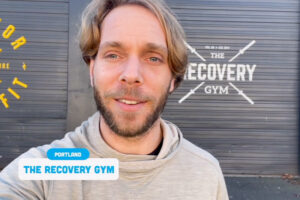Exercise in Recovery: Why Should You?
You can fight it, but the experts agree: Exercise is good for your body, brain and overall recovery. Fear not — it's very easy to get started, and you might even have some fun. Here's how

What your coaches, gym teachers and now, Instagram faves, told you is true: Exercise is good for you. Regular physical activity doesn’t just make you more fit; it can improve your mood, your sleep and even your social life. It can promote brain functioning and even curb substance cravings. That’s a pretty darn good deal for early recovery and sober life!
Simply put, exercise shares a deep connection with an overall sense of well-being, so incorporating daily exercise practices into your regimen can profoundly impact your recovery.
Exercise … for Your Brain
For starters, exercise provides some pretty key benefits for the body — but it can also positively affect the brain. Physical activity has been shown to improve cognitive function, increase brain size and protect against age-related mental decline.
Regular exercise can help alleviate anxiety and depression. Studies have also found that exercise increases serotonin and a neuron-supporting protein called brain-derived neurotrophic factor (BDNF), both of which are essential to brain health. Thinking bigger, if you’ll pardon the pun, exercise has been shown to promote neuroplasticity, the brain’s ability to change and adapt in response to new experiences. So a daily exercise routine can play an essential role in leveling up all sorts of healthy brain functioning. That applies to everyone, but these benefits can be a particular plus for those in recovery seeking clarity and literal peace of mind.
5 Big Benefits of Exercise: Recovery Edition
Looking buff and crushing ultra marathons are perfectly noble goals for the fitness-inclined, but exercise comes with some more modest, if lesser-known, perks for people in recovery as well.
1) Improves Mood
Physical activity has been demonstrated to improve mood and reduce stress, which can help keep you “on the beam” and off the relapse track. Exercise also releases endorphins, which have mood-boosting effects. And — once you’ve conquered a workout, anyway — exercise can increase self-esteem and provide a sense of accomplishment and motivation. These benefits are a significant boost in early recovery when individuals work to establish a new lifestyle.
2) Healthy Social Outlet
One reason that exercise is so beneficial for recovery from addiction is that it provides a healthy social outlet. When people actively engage in substance habits, they often isolate themselves from others. Exercise offers a way to meet other healthy people and develop positive relationships. Fitness circles have a reputation for attracting folks in recovery.
3) Decreases Cravings
In addition to its better-known physical benefits, exercise can actually act to reduce substance cravings and promote feelings of wellness. One recent study found that a regular exercise program in recovery reduced cravings for various substances, including alcohol, nicotine and cocaine.
More generally, exercise increases the body’s levels of dopamine and serotonin, neurotransmitters that are known to play a role in regulating mood. Exercise can provide a useful outlet for managing cravings and promoting long-term sobriety for those in recovery. Use every tool in your toolbox!
4) Improves Sleep Quality
While exercise has long been known to benefit overall health and well-being, its role in promoting healthy sleep patterns is often underappreciated. But appreciate it you will, considering how common it is for substance users and people in early recovery to have sleep issues. Physical movement has a direct impact on sleep by helping to regulate the body’s internal clock, improving sleep quality.
And remember how exercise can help ease negative moods? As you probably know, those can mess with your sleep. Regular activity releases gamma-aminobutyric acid (GABA) in addition to endorphins, and both have a calming effect on the body. These “calm down” neurochemicals are essential in preventing early waking and insomnia. So consider exercise a strongly recommended part of any plan to promote healthy sleep.
5) Substitution for Substance Use
Exercise is a healthy way to spend time that was once spent using substances, simple as that. It can be a time filler that heads off boredom and isolation. It can be done alone or with others, and it can be as simple as taking a walk or swimming. Exercise can be a lot of things with a regimen tailored to fit your needs.
Get Exercise Into Your Recovery Plan!
Exactly how much exercise do I need, you may be wondering. This is a question that researchers have been trying to answer for years. There’s no definitive answer, but the consensus is that moderate-intensity aerobic exercise — such as walking or moderate biking — for 30 minutes, three to five times per week, is an excellent place to start. You can do that.
However, more exercise may be better for people looking to improve their health. A meta-analysis of more than 700 studies found that people who engaged in higher physical activity had a lower risk of dying prematurely than those who were less active.
Is there such a thing as too much? That’s still up for debate, but exercising for more than 90 minutes a day or at a high intensity, such as running a marathon, could have adverse health effects for certain people. Talk it over with your doctor, and find an exercise routine that’s both enjoyable and sustainable in the long term.
Finding the “correct” type of exercise does not have to be complicated. You may prefer to start with something simple, like walking or yoga, or you may want to jump into a more intense workout.
You can try …
- Walking: a great way to get started with exercise. It is low-impact and can be done basically anywhere.
- Yoga: This can help improve flexibility and strength, and can also be a great way to relax and decompress.
- Pilates: Pilates can also help you improve strength and flexibility. And it’s also low-impact, making it a good option for those just starting.
- Running: It has its fans, you know. Running is a fantastic way to get some cardio in, and it can also be particularly therapeutic.
- Weightlifting: Lifting helps build muscle, of course, but it’s also a great way to release cortisol and nervous energy.
“No sweat” isn’t exactly the right way to think about it — hey, recovery always takes work — but the point is, exercise can be easy and fun, and it has a ton of upsides. Get some more tips, and get moving.
More Lifestyle
The Definitive Guide to Sober Travel
Vacations shouldn't be nerve-racking, but in recovery, it's not always that simple. We asked three sober travel pros how to make your trips fun — and more fulfilling than ever.
Sure-Bet Sober Date Ideas
Ready to get back out there? Sober dating isn't so hard. But here are a few pointers anyway, to help you find your groove.
Sobriety Roundtable: What's Your Favorite Sober Activity?
From roller derby to CrossFit and dog fostering to splurging on Mexican, nine sober folks shared what they do for fun and fulfillment. Get some ideas for your own Dry January or longer-term sobriety!
The Joy of Baking (Sober)
Two months sober, Annie Zimmerman decided to make cookies. Now, her hobby turned passion yields fulfillment, connection and delicious soberversary cakes. Read the interview!
Now Elite NFL Players, They First Tackled Addiction | News Roundup
All Sober compiles the best of the latest headlines. Here's your addiction and recovery news for the week of Feb. 19, 2024!
All Sober in Chicago
A great town for recovery, come sun, rain or snow! Check out our video guide to the Windy City's best sober options for bars, bottle shops — and even an arcade with vintage games.
All Sober in New York
The Big Apple truly has it all — including a sober bar with a "witchy vibe" and an array of enchanting non-alc cocktails. Take a peek in our video guide to the sober city!
All Sober in Portland
Oregon's cultural capital may be weird and proud, but it's sober and proud too! We scoped out the coolest sober-friendly spots in our new video guide.










